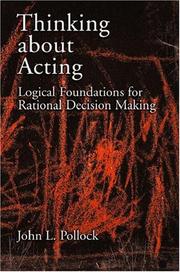| Listing 1 - 5 of 5 |
Sort by
|
Book
ISBN: 0691072833 0691611866 0691629897 1400886465 Year: 1984 Publisher: Princeton, N.J.
Abstract | Keywords | Export | Availability | Bookmark
 Loading...
Loading...Choose an application
- Reference Manager
- EndNote
- RefWorks (Direct export to RefWorks)
Logic --- Philosophy of language --- Semantics (Philosophy) --- Sémantique (Philosophie) --- 800.1 --- Intension (Philosophy) --- Logical semantics --- Semantics (Logic) --- Semeiotics --- Significs --- Syntactics --- Unified science --- Language and languages --- Logic, Symbolic and mathematical --- Logical positivism --- Meaning (Psychology) --- Philosophy, Modern --- Semiotics --- Signs and symbols --- Symbolism --- Analysis (Philosophy) --- Definition (Philosophy) --- Taalfilosofie --- 800.1 Taalfilosofie --- Sémantique (Philosophie)
Book
ISBN: 0691072698 1306994020 0691614261 0691641927 1400856485 9781400856480 9780691072692 9780691614267 Year: 1982 Publisher: Princeton, N.J. Princeton University Press
Abstract | Keywords | Export | Availability | Bookmark
 Loading...
Loading...Choose an application
- Reference Manager
- EndNote
- RefWorks (Direct export to RefWorks)
Most philosophical theories of language have assumed that statements (products of assertion) and propositions (objects of belief) are the same things. John L. Pollock denies this, maintaining that even when the speaker is perfectly sincere, what he is thinking need not be the same thing as what he is saying.Originally published in 1982.The Princeton Legacy Library uses the latest print-on-demand technology to again make available previously out-of-print books from the distinguished backlist of Princeton University Press. These editions preserve the original texts of these important books while presenting them in durable paperback and hardcover editions. The goal of the Princeton Legacy Library is to vastly increase access to the rich scholarly heritage found in the thousands of books published by Princeton University Press since its founding in 1905.
Language and languages --- Meaning (Philosophy) --- Language and logic. --- Languages --- Philosophy. --- Philosophy of language --- Linguistics and logic --- Logic in language --- Philosophy --- Semantics (Philosophy) --- Logic --- Semantics
Book
ISBN: 0091729319 Year: 1987 Publisher: London Unwin Hyman
Abstract | Keywords | Export | Availability | Bookmark
 Loading...
Loading...Choose an application
- Reference Manager
- EndNote
- RefWorks (Direct export to RefWorks)
Theory of knowledge --- Connaissance, theorie de la --- 20e siecle

ISBN: 9780195304817 Year: 2006 Publisher: Oxford New York : Oxford University Press,
Abstract | Keywords | Export | Availability | Bookmark
 Loading...
Loading...Choose an application
- Reference Manager
- EndNote
- RefWorks (Direct export to RefWorks)
Book
ISBN: 3031276647 3031276655 Year: 2023 Publisher: Cham : Springer International Publishing : Imprint: Springer,
Abstract | Keywords | Export | Availability | Bookmark
 Loading...
Loading...Choose an application
- Reference Manager
- EndNote
- RefWorks (Direct export to RefWorks)
This book focuses on how we understand COVID-19—medically, socially, and rhetorically. Given the expectation that other flu pandemics will occur, it stresses the importance of examining how the public response is shaped in the face of global health emergencies. It considers questions such as how can pandemic language both limit and expand our understanding of disease as biomedical, social, and experiential? In what ways can health communication be improved through the study and application of rhetoric and the health humanities? COVID Communication fills a gap in the pandemic literature by promoting interdisciplinary analysis of communication methods, realized through a health humanities approach. It centers human experience and culture within conversations about the biological reality of a pandemic. This volume will be a welcome contribution to the scientific investigations and practice of psychology and public health professionals. Interdisciplinary perspective New insights on how a pandemic is understood Highlights the relevance to important usually neglected relevance for psychology and public health professionals.
Psychology. --- Clinical health psychology. --- Public health. --- Behavioral Sciences and Psychology. --- Health Psychology. --- Public Health. --- COVID-19 --- Comunicació sanitària --- Salut pública --- Public Health --- Medical
| Listing 1 - 5 of 5 |
Sort by
|

 Search
Search Feedback
Feedback About UniCat
About UniCat  Help
Help News
News